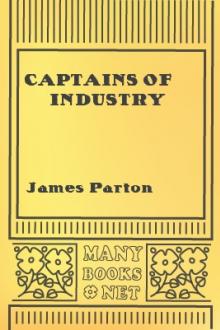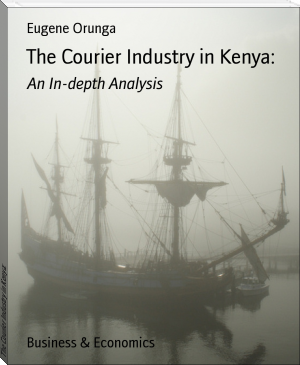Captains of Industry by James Parton (life changing books to read TXT) 📕

- Author: James Parton
- Performer: -
Book online «Captains of Industry by James Parton (life changing books to read TXT) 📕». Author James Parton
The engineer, it appears, if he has an important run to make, comes to his engine an hour before starting. His first business, on an English railroad, is to read the notices, posted up in the engine house, of any change in the condition of the road requiring special care. His next duty is to inspect his engine in every part: first, to see if there is water enough in the boiler, and that the fire is proceeding properly; then, that he has the necessary quantity of water and coal in the tender. He next gets into the pit under his engine, with the proper tools, and inspects every portion of it, trying every nut and pin within his reach from below. Then he walks around the engine, and particularly notices if the oiling apparatus is exactly adjusted. Some parts require, for example, four drops of oil every minute, and he must see that the apparatus is set so as to yield just that quantity. He is also to look into his tool-box, and see if every article is in its place. Mr. Reynolds enumerates twenty-two objects which a good engineer will always have within his reach, such as fire implements of various kinds, machinist tools, lamps of several sorts, oiling vessels, a quantity of flax and yarn, copper wire, a copy of the rules and his time-table; all of which, are to be in the exact place designed for them, so that they can be snatched in a moment.
One of the chief virtues of the engineer and his companion, the fireman, is one which we are not accustomed to associate with their profession; and that is cleanliness. On this point our author grows eloquent, and he declares that a clean engineer is almost certain to be an excellent one in every particular. The men upon a locomotive cannot, it is true, avoid getting black smudge upon their faces. The point is that both the men and their engines should be clean in all the essential particulars, so that all the faculties of the men and all the devices of the engine shall work with ease and certainty.
"There is something," he remarks, "so very degrading about dirt, that even a poor beast highly appreciates clean straw. Cleanliness hath a charm that hideth a multitude of faults, and it is not difficult to trace a connection between habitual cleanliness and a respect for general order, for punctuality, for truthfulness, for all placed in authority."
Do you mark that sentence, reader? The spirit of the Saxon race speaks in those lines. You observe that this author ranks among the virtues "a respect for all placed in authority." That, of course, may be carried too far; nevertheless, the strong races, and the worthy men of all races, do cherish a respect for lawful authority. A good soldier is proud to salute his officer.
On some English railroads both engineers and engines are put to tests much severer than upon roads elsewhere. Between Holyhead and Chester, a distance of ninety-seven miles, the express trains run without stopping, and they do this with so little strain that an engine performed the duty every day for several years. A day's work of some crack engineers is to run from London to Crewe and back again in ten hours, a distance of three hundred and thirty miles, stopping only at Rugby for three minutes on each trip. There are men who perform this service every working day the whole year through, without a single delay. This is a very great achievement, and can only be done by engineers of the greatest skill and steadiness. It was long, indeed, before any man could do it, and even now there are engineers who dare not take the risk. On the Hudson River road some of the trains run from New York to Poughkeepsie, eighty miles, without stopping, but not every engineer could do it at first, and very often a train stopped at Peekskill to take in water. The water is the difficulty, and the good engineer is one who wastes no water and no coal.
Mr. Reynolds enumerates all the causes of accidents from the engine, many of which cannot be understood by the uninitiated. As we read them over, and see in how many ways an engine can go wrong, we wonder that a train ever arrives at its journey's end in safety. At the conclusion of this formidable list, the author confesses that it is incomplete, and notifies young engineers that nobody can teach them the innermost secrets of the engine. Some of these, he remarks, require "years of study," and even then they remain in some degree mysterious. Nevertheless, he holds out to ambition the possibility of final success, and calls upon young men to concentrate all their energies upon the work.
"Self-reliance," he says, "is a grand element of character: it has won Olympic crowns and Isthmian laurels; it confers kinship with men who have vindicated their divine right to be held in the world's memory. Let the master passion of the soul evoke undaunted energy in pursuit of the attainment of one end, aiming for the highest in the spirit of the lowest, prompted by the burning thought of reward, which sooner or later will come."
We perceive that Michael Reynolds possesses one of the prime requisites of success: he believes in the worth and dignity of his vocation; and in writing this little book he has done something to elevate it in the regard of others. To judge from some of his directions, I should suppose that engineers in England are not, as a class, as well educated or as intelligent as ours. Locomotive engineers in the United States rank very high in intelligence and respectability of character.
MAJOR ROBERT PIKE, FARMER.I advise people who desire, above all things, to have a comfortable time in the world to be good conservatives. Do as other people do, think as other people think, swim with the current—that is the way to glide pleasantly down the stream of life. But mark, O you lovers of inglorious ease, the men who are remembered with honor after they are dead do not do so! They sometimes breast the current, and often have a hard time of it, with the water splashing back in their faces, and the easy-going crowd jeering at them as they pant against the tide.
This valiant, stalwart Puritan, Major Robert Pike, of Salisbury, Massachusetts, who was born in 1616, the year in which Shakespeare died, is a case in point. Salisbury, in the early day, was one of the frontier towns of Massachusetts, lying north of the Merrimac River, and close to the Atlantic Ocean. For fifty years it was a kind of outpost of that part of the State. It lay right in the path by which the Indians of Maine and Canada were accustomed to slink down along the coast, often traveling on the sands of the beaches, and burst upon the settlements. During a long lifetime Major Pike was a magistrate and personage in that town, one of the leading spirits, upon whom the defense of the frontier chiefly devolved.
Others were as brave as he in fighting Indians. Many a man could acquit himself valiantly in battle who would not have the courage to differ from the public opinion of his community. But on several occasions, when Massachusetts was wrong, Major Pike was right; and he had the courage sometimes to resist the current of opinion when it was swollen into a raging torrent. He opposed, for example, the persecution of the Quakers, which is such a blot upon the records both of New England and old England. We can imagine what it must have cost to go against this policy by a single incident, which occurred in the year 1659 in Robert Pike's own town of Salisbury.
On a certain day in August, Thomas Macy was caught in a violent storm of rain, and hurried home drenched to the skin. He found in his house four wayfarers, who had also come in for shelter. His wife being sick in bed, no one had seen or spoken to them. They asked him how far it was to Casco Bay. From their dress and demeanor he thought they might be Quakers, and, as it was unlawful to harbor persons of that sect, he asked them to go on their way, since he feared to give offense in entertaining them. As soon as the worst of the storm was over, they left, and he never saw them again. They were in his house about three quarters of an hour, during which he said very little to them, having himself come home wet, and found his wife sick.
He was summoned to Boston, forty miles distant, to answer for this offense. Being unable to walk, and not rich enough to buy a horse, he wrote to the General Court, relating the circumstances, and explaining his non-appearance. He was fined thirty shillings, and ordered to be admonished by the governor. He paid his fine, received his reprimand, and removed to the island of Nantucket, of which he was the first settler, and for some time the only white inhabitant.
During this period of Quaker persecution, Major Pike led the opposition to it in Salisbury, until, at length, William Penn prevailed upon Charles II. to put an end to it in all his dominions. If the history of that period had not been so carefully recorded in official documents, we could scarcely believe to what a point the principle of authority was then carried. One of the laws which Robert Pike dared openly to oppose made it a misdemeanor for any one to exhort on Sunday who had not been regularly ordained. He declared that the men who voted for that law had broken their oaths, for they had sworn on taking their seats to enact nothing against the just liberty of Englishmen. For saying this he was pronounced guilty of "defaming" the legislature, and he was sentenced to be disfranchised, disabled from holding any public office, bound to good behavior, and fined twenty marks, equal to about two hundred dollars in our present currency.
Petitions were presented to the legislature asking the remission of the severe sentence. But even this was regarded as a criminal offense, and proceedings were instituted against every signer. A few acknowledged that the signing was an offense, and asked the forgiveness of the court, but all the rest were required to give bonds for their appearance to answer.
Another curious incident shows the rigor of the government of that day. According to the Puritan law, Sunday began





Comments (0)